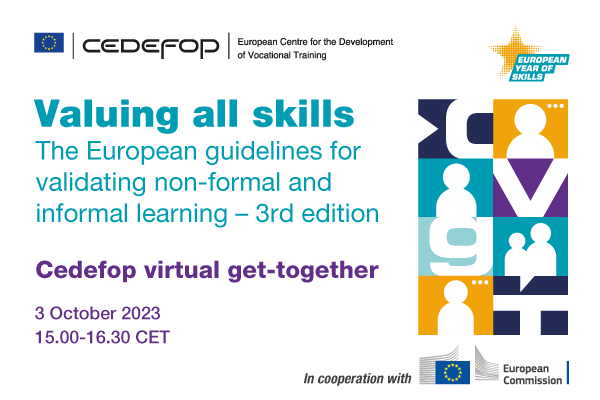The European Year of Skills puts the importance of having a skilled workforce to support the green and digital transitions in the spotlight. Having skilled and knowledgeable citizens is not just a matter of formal education (e.g. schools and universities). It is also critically dependent on learning acquired in non-formal or informal contexts, such as at work or during leisure time. Validation is a tool for citizens to demonstrate the skills they have acquired in these contexts. It facilitates obtaining qualifications, access to training, and job market entry.
The third edition of the European guidelines for validating non-formal and informal learning has been developed by Cedefop in close collaboration with the European Commission and in consultation with Member States and experts over the last three years. The guidelines target everybody involved in setting up, development and implementation of validation. Alongside being a source for inspiration, the guidelines are also meant to stimulate reflection on how to best address common issues and challenges across levels and contexts.
This European Year of Skills Virtual Get-together, organised in cooperation with the European Commission, demonstrated key features of the new guidelines and showcased experiences in addressing challenges in the implementation of validation from different perspectives.
Video recording
The video recording of the event can be watched from here.
(By following the link, the YouTube privacy policy and cookies will apply)
Agenda
Times are indicated in CET.
| 15.00 – 15.05 | Opening and welcome by Jasper van Loo (Cedefop) and Koen Nomden (European Commission) |
| 15.05 – 15.25 | The new European guidelines: A tool to support validation in Europe - Presentation by Aline Jürges (European Commission) and Ernesto Villalba (Cedefop) |
| 15.25 – 16.25 |
The guidelines in practice
|
| 16.25 – 16.30 | Closure by Aline Jürges (European Commission) and Ernesto Villalba (Cedefop) |
Speakers
|
View moreShe is on the European Qualifications Framework - EQF Advisory Group as Italian representative for the implementation of the EU Council Recommendations on the EQF and Validation of non formal and informal learning NFIL and she is part of the Italian EQF National Coordination Point. Since 2002 she has been dealing with national and international studies for the analysis, assessment and development of adult competences, taking part in OECD PIAAC, the “Programme for the International Assessment for Adult Competencies” first Cycle (2008-2013) as National Quality Manager and Occupations and Sectors Coordinator. |
|
She is currently a Policy Officer in the ”Skills Agenda” Unit within DG Employment, which is devoted to co-ordinating the European Skills Agenda, working across the Commission to make sure its 12 flagship actions deliver on the ground. View moreAline has been focusing in the past years on policies to empower individuals to learn, notably on career guidance and more recently on validation. Her work on validation is closely linked to the Unit’s work of making people's skills and qualifications more easily understood across borders, notably through the European Qualifications Framework (EQF). |
|
Before that he was a policy officer in charge of the validation of non-formal and informal learning and career guidance. |
|
Principals of the scheme are a consortium of industry partners and of these recognized national trade associations. View moreThrough an operating agreement a consortium of industry partners is responsible for ensuring quality and relevance in the system and for further developing it at a pace that meets the needs of the industry. |
|
Michelle had been in the hairdressing industry for 25 years before getting the opportunity to earn her level 6 Advanced Certificate in Hairdressing through RPL. View moreShe has a broad and extensive knowledge of all aspects of the hairdressing industry having completed numerous hairdressing courses throughout her career including industry specific masters in colour, cutting and business. Having only recently stepped away from being behind the chair while also managing an award winning salon Michelle has just joined the team at Limerick and Clare Education and Training Board as both a tutor and RPL mentor and is very much looking forward to teaching a level 3 in hairdressing while also mentoring a group of hairdressers who will be working to receive their own level 6 Advanced Certificate in Hairdressing in the coming weeks. |
|
She has been working at PVE since 2019 in charge of programs that promote the validation and certification of transversal competences through volunteering in Spain such as the VOL+ program. View moreShe is also in charge of other programs such as eVA-VOL (e-validation of learning outcomes through volunteering) and the Certifica+ program (a quality seal for volunteer trainings that incorporate competence improvement). Among her latest publications are 'Learning beyond the classroom: the role of volunteering in competence development' (2022) and 'Volunteering, competence certification and employability: Evaluation of the VOL+ Program' (2021). She’s been working on the Third Sector for more than 12 years. Her most recent job positions include the Coordination of the Centre of Social Innovation at San Andrés University and the Coordination of the Social Enterprise Knowledge Network. She has a Master’s degree in Governance and Human Rights, a Postgraduate in Nonprofit Organizations and a BA in Psychology. |
|
He currently coordinates the labour market and skills analysis work of the agency. He is also part of the team investigating EU skills trends using online job vacancies. View moreHe has a master degree in quantitative and general economics and holds a Ph.d. in social sciences. As a researcher and project manager at the Dutch research centre for education and the labour market (ROA) Jasper led research projects on labour market issues, skills, employability and obsolescence of knowledge. He also worked on HRD and HRM, taking an economic perspective to human resources issues. Jasper started working for Cedefop in 2007. He led the centre’s early work on skill mismatch, coordinated the centre’s work on national VET systems and policies for several years, and led the centre’s skills governance work. |
|
He is currently responsible for Cedefop’s work on validation of non-formal and informal learning. He has worked, together with the Commission, on the monitoring, implementation and evaluation of the 2012 Council Recommendation on validation, as well as on several updates of the European inventory of validation and the European guidelines. View moreErnesto has served in different committees and working groups of the European Commission, the OECD, and UNESCO. He holds a PhD in International and comparative education from Stockholm University and is on the editorial board of the European Journal of Education. |
Event details
Downloads
Presentation "EU approach and guidelines on validation of non-formal and informal learning" A. Juerges, E. Villalba
 Michela Bastianelli is a sociologist in organizational and labour market studies and holds a post degree qualification in management and development of human resources and structural funds. She is a researcher at ANPAL – The Italian National Agency for Active Labour Market Policies.
Michela Bastianelli is a sociologist in organizational and labour market studies and holds a post degree qualification in management and development of human resources and structural funds. She is a researcher at ANPAL – The Italian National Agency for Active Labour Market Policies.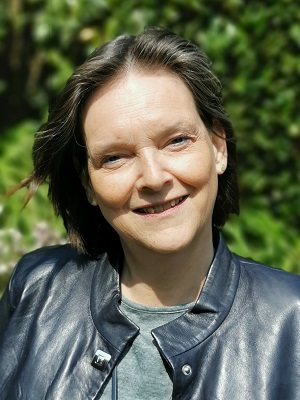 Aline Jürges has been working at the European Commission since 2001.
Aline Jürges has been working at the European Commission since 2001.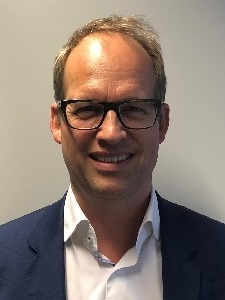 Koen Nomden is currently Team Leader for “Transparency and Recognition of Skills and Qualifications”, within the Skills Agenda Unit of the European Commission (DG Employment, Social Affairs and Inclusion).
Koen Nomden is currently Team Leader for “Transparency and Recognition of Skills and Qualifications”, within the Skills Agenda Unit of the European Commission (DG Employment, Social Affairs and Inclusion).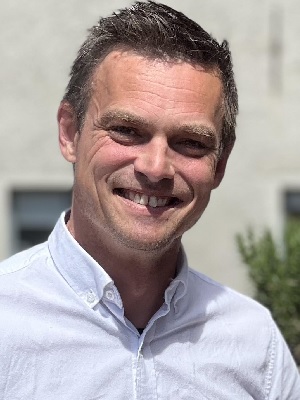 Johan Nordberg is involved in the Svensk industrivalidering in Sweden, a national system for validating skills that are critical for a sustainable and competitive production of goods and industrial services.
Johan Nordberg is involved in the Svensk industrivalidering in Sweden, a national system for validating skills that are critical for a sustainable and competitive production of goods and industrial services. Michelle Nugent-Considine is a tutor and RPL mentor with the Limerick and Clare Education and Training Board based in the Ennis Campus.
Michelle Nugent-Considine is a tutor and RPL mentor with the Limerick and Clare Education and Training Board based in the Ennis Campus. Maida Pieper is a project technician at Spanish Volunteering Platform (PVE).
Maida Pieper is a project technician at Spanish Volunteering Platform (PVE).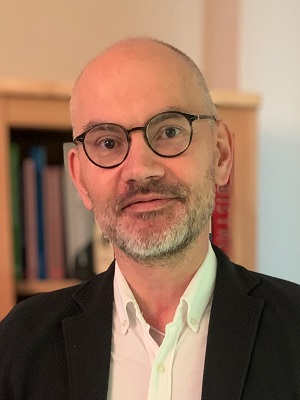 Jasper Van Loo is coordinator of Cedefop’s department for VET and Skills.
Jasper Van Loo is coordinator of Cedefop’s department for VET and Skills.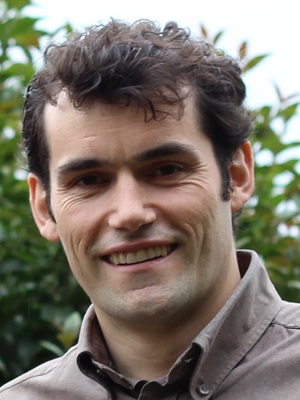 Ernesto Villalba-Garcia has worked at Cedefop since 2011.
Ernesto Villalba-Garcia has worked at Cedefop since 2011.